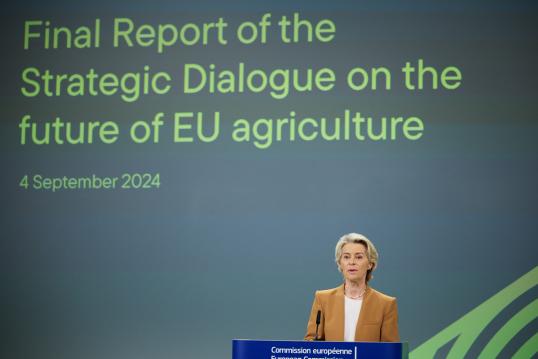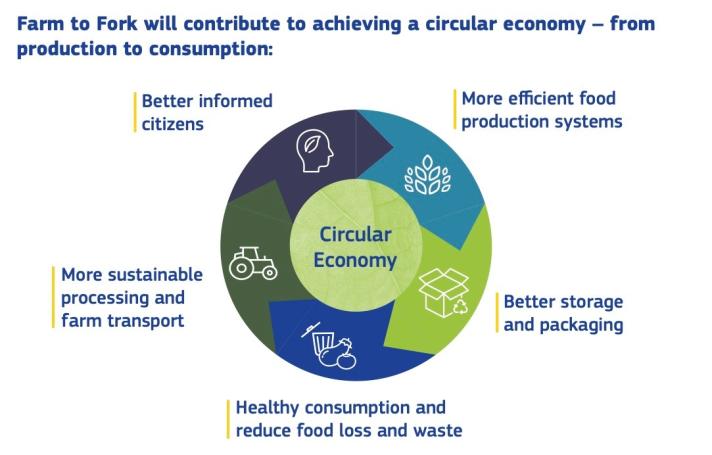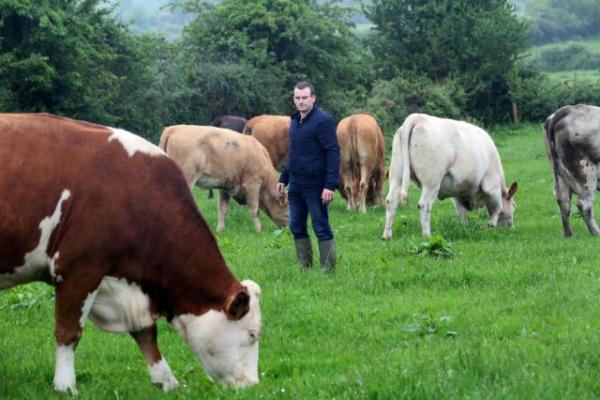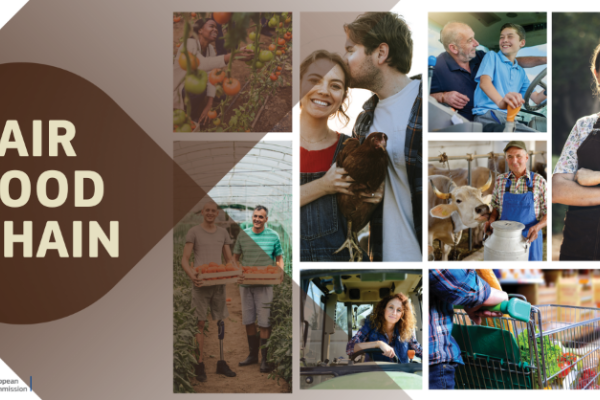Before joining the European Union Ireland was almost entirely economically dependent on farming, but the country now has a more diverse, open economy.
Despite this shift, agriculture remains both economically vital and culturally significant in Irish life. However, the sector faces increasing pressures from volatile market prices, an aging farming population, and rural decline.
Global events, such as Russia’s ongoing war in Ukraine, climate change, rising food insecurity and Brexit also directly impact Irish farming and rural communities.
The Common Agricultural Policy (CAP) plays a crucial role in helping Ireland, and other EU Member States, to address both global and local issues by providing a mutually agreed framework to find common solutions to these problems.
EU agricultural policy focus
First introduced in 1962, the Common Agricultural Policy (CAP) is a shared EU policy, updated regularly to ensure farmers earn fair incomes, consumers access safe food, and evolving challenges like climate change are addressed.
The CAP is funded through two main EU budget sources:
- European Agricultural Guarantee Fund (EAGF) – provides direct income support to farmers and funds for market measures.
- European Agricultural Fund for Rural Development (EAFRD) – funds programmes for agriculture, forestry, and environmental sustainability in rural areas.
Member States manage these funds themselves and can transfer up to 25% of their allocation between the EAGF and EAFRD to best meet national agricultural priorities.
The CAP 2023-27 entered into force on 1 January 2023 and it is built around ten specific goals aligned with EU social, environmental, and economic aims, including Green Deal and Digital Transition targets.

A significant change in this latest CAP is the New Delivery Model (NDM), through which EU countries implement the policy using their own national Strategic Plans.
These Plans are monitored by the European Commission and regularly assessed through the Performance Monitoring and Evaluation Framework (PMEF), using a range of indicators to measure each Member State’s CAP plan performance.
For the 2023-2027 period, the CAP is supported by €307 billion, of which €264 billion comes from the EU budget, and an additional €43 billion from national funds.
Recent CAP developments
In response to protests and feedback from Member States and farmer groups, the European Commission proposed a CAP revision in March 2024 to address key challenges in agriculture. The updates, approved by MEPs, aim to simplify CAP rules, reduce administrative burdens, and strengthen the position of farmers in the food supply chain.
The changes provide greater flexibility for farmers, particularly in managing CAP measures during extreme weather events.
Key actions include:
- Reduced Bureaucracy: A 50% reduction in on-farm compliance visits by national bodies.
- Funding for Voluntary Environmental Actions: €98 billion dedicated to climate, environmental, and animal welfare improvements.
- Exemptions for Small Farms: Farms under 10 hectares are exempt from conditionality compliance checks and penalties.
- Flexible CAP Strategic Plans: Member States can amend plans more frequently to meet evolving agricultural needs.
“Europe’s quality of life depends on having a secure and affordable supply of quality local food. Farming is a core part of our European way life - and it must always stay that way.”
Ursula von der Leyen, European Commission President (2024)
Additionally, limits on advance CAP payments have been raised, with direct payment advances up to 70% (from 50%) and area/animal-based interventions at 85% (from 75%) to support farmers facing financial pressures from extreme weather events and other challenges.

European Commission President Ursula von der Leyen has vowed to present a Vision for Agriculture and Food in the first 100 days of the new Commission’s mandate. This Vision will build on recommendations from the final report of the Strategic Dialogue on the Future of EU Agriculture, a forum of experts that gathered input from farmers, agri-food businesses, rural communities, NGOs, financial institutions, and academia.
Rural development
Preservation of Ireland’s famously beautiful countryside has traditionally been supported by the CAP’s Rural Development Programmes (RDPs).
Changes in the CAP 2023-27 mean rural development actions are now incorporated into national CAP strategic plans, and the needs of rural areas are also addressed by other EU funding tools such as the Recovery and Resilience Facility (RRF) and the European Structural and Investment Funds (ESIF).
A priority for rural development in Ireland is sustainable growth, particularly in restoring, preserving, and enhancing ecosystems linked to agriculture, such as boglands and forests.
CAP 2023-27 prioritises objectives such as climate resilience, resource efficiency, and carbon-neutral agriculture to align with EU environmental targets.
LEADER is the mechanism that delivers development to local rural communities and it is administered by Local Action Groups (LAGs), which are partnerships of public and private entities that manage project selection and approval locally.
The LEADER programme in Ireland has a total financial allocation of €180 million, distributed across 29 local action groups, reaching more than 80% of Ireland’s rural population. Funds are directed toward projects that protect the environment and enhance rural development, particularly in employment, tourism, infrastructure, and social inclusion.
The European Commission has set out a long-term vision for the EU’s rural areas up to 2040 and is working on implementing a Rural Pact and an EU Rural Action Plan focussed on digital access, economic resilience, and initiatives to encourage young people to remain in rural areas.
Ireland’s CAP Strategic Plan
Ireland’s CAP Strategic Plan has a budget of just under €10 billion for the 2023-27 period, with about 60% allocated to direct income support and 40% to sectoral support and rural development measures.
Nearly €7.5 billion comes from the EU budget, with €3 billion reserved for specific goals that support climate objectives through eco-schemes, biodiversity initiatives on farms, and rural development projects.
CAP Strategic Plans can be amended to address evolving environmental and economic needs, usually as a result of feedback from farmers and other stakeholders. Ireland’s strategic plan has been amended three times, most recently to enhance support for young farmers, increase biodiversity funding, and provide greater flexibility to address challenges such as extreme weather.
The Irish Strategic Plan aims to reduce the income gap between farming and other sectors of the economy. Over €590 million is dedicated to promoting a more balanced distribution of support towards small and medium sized farms.
The new CAP encourages young farmers to join the profession with almost €178 million allocated for additional income support to young Irish farmers.
Currently less than 7% of Irish farmers are under the age of 35. The CAP aims to boost that figure and help new generations of farmers with measures such as:
- Increased mentoring and knowledge transfer
- More flexibility on taxation and inheritance rules
- Easier access to loans with lower interest rates and longer repayment periods.
Ireland faces major challenges related to meeting EU environmental and climate objectives. The Strategic Plan allocates more than €1.5 billion to a new Agri-Climate Rural Environment Scheme (ACRES) that targets 50,000 farmers with specific actions to improve biodiversity, air and water quality.
Wetlands and peatlands will be better protected under the plan with use of all types of fertilisers and plant protection products restricted in buffer zones along watercourses.
Over €250 million will be dedicated to tripling the area of agricultural land under organic production. Irish farmers growing protein crops (such as peas, beans, lupins, soya) will receive bonuses aimed at reducing Ireland’s reliance on imported protein feed and improving their competitiveness.
A gender balanced approach will be applied in the distribution of the CAP Plan’s financial aid and women farmers will receive bonuses for investments and benefit from female-focused groups for knowledge transfer.
Innovation for sustainable agriculture
Investment in the future of agriculture is supported through the Horizon Europe programme, which focuses on research and innovation in food, agriculture, rural development, and the bioeconomy.
A prime example of a successful Horizon-funded project is the Irish-led MASTER initiative, which received €11.85 million in EU funding. This project developed methods to enhance food quality by harnessing microbiomes—tiny organisms in the gut crucial for digestion and health.
Led by Professor Paul Cotter of Ireland’s national agency for agricultural research, advisory, and education, Teagasc, the project’s innovations - including a way to reduce the amount of methane emitted by cows - are helping improve the quality, safety and sustainability of our food and farms.
The EU also created the European Innovation Partnership for Agricultural Productivity and Sustainability (EIP-AGRI) to help ensure that research responds to ground-level needs of farmers and foresters.
EIP-AGRI is now part of the EU CAP Network forum, which serves as a platform for knowledge exchange, information sharing, and peer-to-peer learning to support national CAP strategic plans.
Irish EIP-AGRI Innovation Award success
In 2024, an Irish operational group won an EIP-AGRI Innovation Award while two others were shortlisted as nominees.
- Illaun Farm-Forest Alliance: This group won the Sustainable Forest Management award for developing a new approach to farm forestry in Ireland. They collaborated with farmers to plant thousands of trees, creating a model that enhances sustainability, water quality, and biodiversity.
- Sustainable Uplands Agri-environment Scheme (SUAS): Nominated for its efforts in improving upland habitats in the Wicklow and Dublin Mountains, SUAS rewards farmers for effective habitat management.
- Biodiversity Regeneration in a Dairying Environment (BRIDE): This initiative received a nomination for its work in reducing biodiversity loss in the Bride Valley by encouraging farmers to set aside at least 10% of their land as ‘Space for Nature.’
EU strategies for food and biodiversity
The European Commission has adopted two key strategies to align the CAP with the ambitious goals of the European Green Deal. These strategies aim to transform European food systems and promote environmental sustainability.
- The Farm to Fork Strategy: This consumer-focused strategy seeks to create a fair, healthy, and environmentally-friendly food system across Europe. It outlines concrete targets, such as a 50% reduction in pesticide use, a 20% decrease in fertilizer use, a 25% increase in organic farming land, and a 50% reduction in antimicrobials used in farm animals.

- The Biodiversity Strategy for 2030: This strategy tackles the root causes of biodiversity loss, including unsustainable land use, resource overexploitation, pollution, and invasive species. It proposes specific actions like bringing back pollinators to agricultural land, encouraging organic farming and other biodiversity-friendly practices, and establishing binding targets for ecosystem restoration.
These complementary strategies play a crucial role in ensuring a more sustainable future for European agriculture and the environment.
Support during times of crisis
The European Commission has legal tools that enable swift responses during times of disruption in the agriculture sector.
From 2014 to 2023, the Commission adopted 63 exceptional measures to aid farmers during events like the Covid-19 pandemic and Russia’s invasion of Ukraine, allocating over €2.5 billion in EU funds to those most affected during these crises.
The CAP 2023-27 includes a crisis reserve fund of €450 million per year, which can be quickly activated to deploy financial aid when and where needed during emergencies.
In 2023, €9.5 million from the crisis reserve was allocated to Irish farmers from €330 million distributed to EU nations facing extreme weather and high input costs.
The Temporary Crisis and Transition Framework (TCTF) allows Member States flexibility in State Aid, with its extension to December 2024 addressing ongoing agricultural and fisheries market challenges.
The European Food Security Crisis Mechanism (EFSCM), established after Covid-19, identifies risks to the EU food supply chain and coordinates responses to threats like those from the war in Ukraine.
Agricultural Market measures explained
Exceptional agricultural market measures
Irish agriculture: facts and figures
- 99% of Ireland is covered by predominantly rural and intermediate regions, more than double the EU-27 average.
- There are around 135,000 farms in Ireland, with an average farm size of 33.4 hectares.
- The average age of farmers in Ireland is 58, according to the 2023 Teagasc National Farm Survey.
- 10% of farm operators in Ireland are female.
- Ireland has 127,000 active farmers and boasts high agricultural productivity. Yet, despite this, farm workers often earn less than those in other sectors.
- In 2023, Ireland produced 336,000 tonnes of potatoes, equivalent to only 0.7% of the total EU crop of 48.3 million tonnes.
Latest agriculture news

- News article
President of the European Commission Ursula von der Leyen received today the final report of the Strategic Dialogue on the Future of EU Agriculture, handed over by the group's chair, Professor Peter Strohschneider.
- 5 min read

- News article
The European Commission has adopted a Communication clarifying the use of force majeure and exceptional circumstances for the EU agricultural sector in case of unforeseeable and extreme weather events.
- 3 min read

- News article
Delivering on its commitment to ease administrative burden for EU farmers, the Commission has proposed to review certain provisions of the Common Agricultural Policy (CAP), aiming to deliver simplifications while maintaining a strong, sustainable and competitive policy for EU agriculture and food.
- 7 min read

